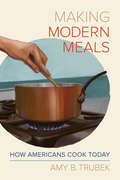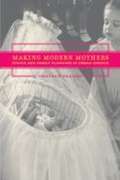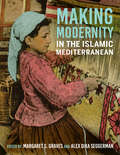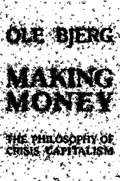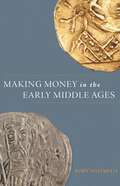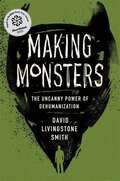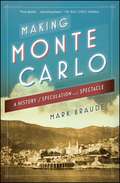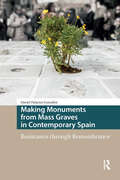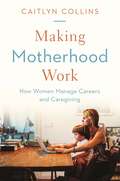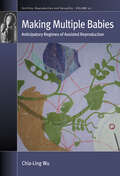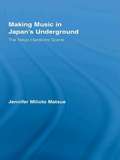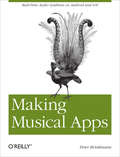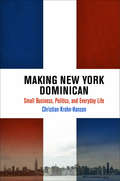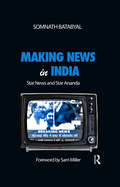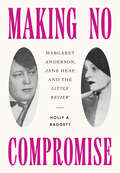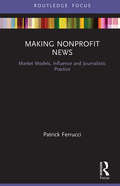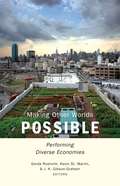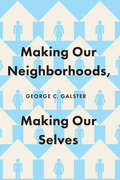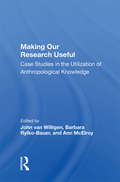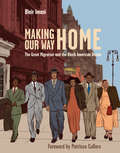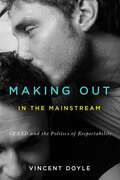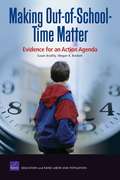- Table View
- List View
Making Modern Meals: How Americans Cook Today
by Amy B. TrubekHome cooking is crucial to our lives, but today we no longer identify it as an obligatory everyday chore. By looking closely at the stories and practices of contemporary American home cooks—witnessing them in the kitchen and at the table—Amy B. Trubek reveals our episodic but also engaged relationship to making meals. Making Modern Meals explores the state of American cooking over the past century and across all its varied practices, whether cooking is considered a chore, a craft, or a creative process. Trubek challenges current assumptions about who cooks, who doesn’t, and what this means for culture, cuisine, and health. She locates, identifies, and discusses the myriad ways Americans cook in the modern age, and in doing so, argues that changes in making our meals—from shopping to cooking to dining—have created new cooks, new cooking categories, and new culinary challenges.
Making Modern Mothers: Ethics and Family Planning in Urban Greece
by Heather PaxsonIn Greece, women speak of mothering as "within the nature" of a woman. But this durable association of motherhood with femininity exists in tension with the highest incidence of abortion and one of the lowest fertility rates in Europe. In this setting, how do women think of themselves as proper individuals, mothers, and Greek citizens? In this anthropological study of reproductive politics and ethics in Athens, Greece, Heather Paxson tracks the effects of increasing consumerism and imported biomedical family planning methods, showing how women's "nature" is being transformed to meet crosscutting claims of the contemporary world. Locating profound ambivalence in people's ethical evaluations of gender and fertility control, Paxson offers a far-reaching analysis of conflicting assumptions about what it takes to be a good mother and a good woman in modern Greece, where assertions of cultural tradition unfold against a backdrop of European Union integration, economic struggle, and national demographic anxiety over a falling birth rate.
Making Modernity in the Islamic Mediterranean
by Marcus Milwright Peter Christensen Ünver Rüstem Gülru Çakmak Hala Auji Emily Neumeier Jessica Gerschultz Ashley Dimmig David J. RoxburghThe Islamic world's artistic traditions experienced profound transformation in the 19th century as rapidly developing technologies and globalizing markets ushered in drastic changes in technique, style, and content. Despite the importance and ingenuity of these developments, the 19th century remains a gap in the history of Islamic art. To fill this opening in art historical scholarship, Making Modernity in the Islamic Mediterranean charts transformations in image-making, architecture, and craft production in the Islamic world from Fez to Istanbul. Contributors focus on the shifting methods of production, reproduction, circulation, and exchange artists faced as they worked in fields such as photography, weaving, design, metalwork, ceramics, and even transportation. Covering a range of media and a wide geographical spread, Making Modernity in the Islamic Mediterranean reveals how 19th-century artists in the Middle East and North Africa reckoned with new tools, materials, and tastes from local perspectives.
Making Money
by Ole BjergWhat is money? Where does it come from? Who makes our money today? And how can we understand the current state of our economy as a crisis of money itself? In Making Money, Ole Bjerg turns these questions into a matter of philosophical rather than economic analysis. Using the thinking of Slavoj i ek, while still engaging with mainstream economic literature, the book provides a genuinely philosophical theory of money. This theory is unfolded in reflections on the nature of monetary phenomenon such as financial markets, banks, debt, credit, derivatives, gold, risk, value, price, interests, and arbitrage. The analysis of money is put into an historical context by suggesting that the current financial turbulence and debt crisis are symptoms that we live in the age of post-credit capitalism. By bridging the fields of economics and contemporary philosophy, Bjerg's work engages in a productive form of intellectual arbitrage.From the Trade Paperback edition.
Making Money in the Early Middle Ages
by Rory NaismithAn examination of coined money and its significance to rulers, aristocrats and peasants in early medieval EuropeBetween the end of the Roman Empire in the fifth century and the economic transformations of the twelfth, coined money in western Europe was scarce and high in value, difficult for the majority of the population to make use of. And yet, as Rory Naismith shows in this illuminating study, coined money was made and used throughout early medieval Europe. It was, he argues, a powerful tool for articulating people’s place in economic and social structures and an important gauge for levels of economic complexity. Working from the premise that using coined money carried special significance when there was less of it around, Naismith uses detailed case studies from the Mediterranean and northern Europe to propose a new reading of early medieval money as a point of contact between economic, social, and institutional history.Naismith examines structural issues, including the mining and circulation of metal and the use of bullion and other commodities as money, and then offers a chronological account of monetary development, discussing the post-Roman period of gold coinage, the rise of the silver penny in the seventh century and the reconfiguration of elite power in relation to coinage in the tenth and eleventh centuries. In the process, he counters the conventional view of early medieval currency as the domain only of elite gift-givers and intrepid long-distance traders. Even when there were few coins in circulation, Naismith argues, the ways they were used—to give gifts, to pay rents, to spend at markets—have much to tell us.
Making Monsters: The Uncanny Power of Dehumanization
by David Livingstone SmithA leading scholar explores what it means to dehumanize others—and how and why we do it. “I wouldn’t have accepted that they were human beings. You would see an infant who’s just learning to smile, and it smiles at you, but you still kill it.” So a Hutu man explained to an incredulous researcher, when asked to recall how he felt slaughtering Tutsis in Rwanda in 1994. Such statements are shocking, yet we recognize them; we hear their echoes in accounts of genocides, massacres, and pogroms throughout history. How do some people come to believe that their enemies are monsters, and therefore easy to kill? In Making Monsters David Livingstone Smith offers a poignant meditation on the philosophical and psychological roots of dehumanization. Drawing on harrowing accounts of lynchings, Smith establishes what dehumanization is and what it isn’t. When we dehumanize our enemy, we hold two incongruous beliefs at the same time: we believe our enemy is at once subhuman and fully human. To call someone a monster, then, is not merely a resort to metaphor—dehumanization really does happen in our minds. Turning to an abundance of historical examples, Smith explores the relationship between dehumanization and racism, the psychology of hierarchy, what it means to regard others as human beings, and why dehumanizing others transforms them into something so terrifying that they must be destroyed. Meticulous but highly readable, Making Monsters suggests that the process of dehumanization is deeply seated in our psychology. It is precisely because we are all human that we are vulnerable to the manipulations of those trading in the politics of demonization and violence.
Making Monte Carlo: A History of Speculation and Spectacle
by Mark BraudeA rollicking narrative history of Monte Carlo, capturing its nineteenth-century rise as the world's first modern casino-resort and its Jazz Age heyday as infamous playground of the rich.Monte Carlo has long been known as a dazzling playground for the rich and famous. Less well known are the shrewd and often ruthless strategies that went into creating such a potent symbol of luxury and cosmopolitan glamour. As historian Mark Braude reveals in his entertaining and informative Making Monte Carlo, the world's first modern casino-resort started as an unlikely prospect--with the legalization of gambling in tiny Monaco in 1855--and eventually emerged as the most glamorous gambling destination of the Victorian era. The resort declined in the wake of WWI, and was reinvented, again, to suit the styles and desires of the new Jazz Age tastemakers, such as F. Scott and Zelda Fitzgerald, Gerald and Sarah Murphy, and Coco Chanel. Along the way, we encounter a colorful cast of characters, including the fast-talking Francois Blanc (a professional gambler, stock market manipulator, and founder of Monte Carlo); Basil Zaharoff (notorious munitions dealer and possible secret owner of the casino in the 1920s); Elsa Maxwell (a brash society figure and Hollywood maven, hired as the casino's publicist); Réné Léon (a visionary Jewish businessman, who revitalized the resort after WWI); Jean Cocteau, Pablo Picasso, and other satellite members of Serge Diaghilev's Ballet Russes dance company; as well as Cole Porter, Ernest Hemingway and other American expats who 'colonized' the Riviera in the 1920s. A rollercoaster history of how a small, rural town grew into the prosperous resort epicenter of the late nineteenth century and rose again to greatness out of the ashes of WWI, Making Monte Carlo is a classic rags-to-riches tale set in the most scenic of European settings.
Making Monuments from Mass Graves in Contemporary Spain: Resistance through Remembrance (Heritage and Memory Studies)
by Daniel Palacios GonzálezThis book narrates how, beginning in 1936, bodies buried in mass graves during the Spanish War and subsequent dictatorship were turned into monuments. The book describes how the production of monuments evolved and what forms this process and these monuments took; it examines how the monuments were incorporated into society and used to influence public opinion; and it argues that this process was not simply based on the formal logic of tradition but instead reflected a conscious plan with a specific and rational end goal. As such, this book puts forward the idea that the monument as a material object became an expression of the historical consciousness of its producers, relating how different actors communicated their memories into meaningful gestures while limited by the material reality of integrating the bodies into a novel artefact. Finally, it contends that the people creating these monuments did not just bury their dead according to a funerary tradition but also sought to influence society.
Making Motherhood Work: How Women Manage Careers and Caregiving
by Caitlyn CollinsA moving, cross-national account of working mothers’ daily lives—and the revolution in public policy and culture needed to improve themThe work-family conflict that mothers experience today is a national crisis. Women struggle to balance breadwinning with the bulk of parenting, and stress is constant. Social policies don’t help. Of all Western industrialized countries, the United States ranks dead last for supportive work-family policies: No federal paid parental leave. The highest gender wage gap. No minimum standard for vacation and sick days. The highest maternal and child poverty rates. Can American women look to European policies for solutions? Making Motherhood Work draws on interviews that sociologist Caitlyn Collins conducted over five years with 135 middle-class working mothers in Sweden, Germany, Italy, and the United States. She explores how women navigate work and family given the different policy supports available in each country.Taking readers into women’s homes, neighborhoods, and workplaces, Collins shows that mothers’ desires and expectations depend heavily on context. In Sweden—renowned for its gender-equal policies—mothers assume they will receive support from their partners, employers, and the government. In the former East Germany, with its history of mandated employment, mothers don’t feel conflicted about working, but some curtail their work hours and ambitions. Mothers in western Germany and Italy, where maternalist values are strong, are stigmatized for pursuing careers. Meanwhile, American working mothers stand apart for their guilt and worry. Policies alone, Collins discovers, cannot solve women’s struggles. Easing them will require a deeper understanding of cultural beliefs about gender equality, employment, and motherhood. With women held to unrealistic standards in all four countries, the best solutions demand that we redefine motherhood, work, and family.Making Motherhood Work vividly demonstrates that women need not accept their work-family conflict as inevitable.
Making Multiple Babies: Anticipatory Regimes of Assisted Reproduction (Fertility, Reproduction and Sexuality: Social and Cultural Perspectives #52)
by Chia-Ling WuHuman beings have been producing more twins, triplets, and quadruplets than ever before, due to the expansion of medically assisted conception. This book analyzes the anticipatory regimes of making multiple babies. With archival documents, participant observation, in-depth interviews, and registry data, this book traces the global and local governance of the assisted reproductive technologies (ARTs) used to tackle multiple pregnancy since the 1970s, highlighting the early promotion of single embryo transfer in Belgium and Japan and the making of the world’s most lenient guidelines in Taiwan.
Making Music in Japan's Underground: The Tokyo Hardcore Scene (East Asia: History, Politics, Sociology and Culture #3)
by Jennifer Milioto MatsueGrounded in the fields of Ethnomusicology, Anthropology, Popular Music Studies, and Japanese Studies, this book explores the underground Tokyo hardcore scene, ultimately asking what play as resistance through performance of the scene tells us about Japanese society in general. Matsue highlights the complicated positioning of young adult Japanese in contemporary Japan as they negotiate both increasing social demands and increasing problems in society at large. Further drawing on theories of play, identity building, and the construction of gender, all informed by the increasingly influential field of Performance Studies, the book offers a highly interdisciplinary look at the importance of musical scenes for expressing resistance at the turn of the 21st century. Within the underground Tokyo hardcore scene this resistance is expressed through play with individual and collective identity, in intimate and potentially illicit spaces, with an arguably challenging sound and performance style.
Making Musical Apps: Real-time audio synthesis on Android and iOS
by Peter BrinkmannWant to turn your mobile device into a musical instrument? Or equip your game with interactive audio, rather than canned samples? You can do it with Pure Data (Pd), an open source visual programming environment that lets you manipulate digital audio in real time. This concise book shows you how to use Pd—with help from the libpd library—as an easily embeddable and widely portable sound engine.Whether you’re an audio developer looking to create musical apps with sophisticated audio capabilities, or an application developer ready to enhance mobile games with real-time procedural audio, Making Musical Apps introduces you to Pd and libpd, and provides hands-on instructions for creating musical apps for Android and iOS.Get a crash course in Pd, and discover how to generate and control soundsLearn how to create and deploy algorithmic compositions that react to a user’s activity and environmentUse Java or Objective-C to integrate Pd and libpd into mobile appsLearn the steps necessary to build libpd-based apps for Android and iOS
Making National News
by Gene AllenFor almost a century, Canadian newspapers, radio and television stations, and now internet news sites have depended on the Canadian Press news agency for most of their Canadian (and, through its international alliances) foreign news. This book provides the first-ever scholarly history of CP, as well as the most wide-ranging historical treatment of twentieth-century Canadian journalism published to date.Using extensive archival research, including complete and unfettered access to CP's archives, Gene Allen traces how CP was established and evolved in the face of frequent conflicts among the powerful newspaper publishers - John Ross Robertson, Joseph Atkinson, and Roy Thomson, among others - who collectively owned it, and how the journalists who ran it understood and carried out their work. Other major themes include CP's shifting relationships with the Associated Press and Reuters; its responses to new media; its aggressive shaping of its own national role during the Second World War; and its efforts to meet the demands of French-language publishers.Making National News makes a substantial and original contribution to our understanding of journalism as a phenomenon that shaped Canada both culturally and politically in the twentieth century.
Making New York Dominican
by Christian Krohn-HansenLarge-scale emigration from the Dominican Republic began in the early 1960s, with most Dominicans settling in New York City. Since then the growth of the city's Dominican population has been staggering, now accounting for around 7 percent of the total populace. How have Dominicans influenced New York City? And, conversely, how has the move to New York affected their lives? In Making New York Dominican, Christian Krohn-Hansen considers these questions through an exploration of Dominican immigrants' economic and political practices and through their constructions of identity and belonging.Krohn-Hansen focuses especially on Dominicans in the small business sector, in particular the bodega and supermarket and taxi and black car industries. While studies of immigrant business and entrepreneurship have been predominantly quantitative, using survey data or public statistics, this work employs business ethnography to demonstrate how Dominican enterprises work, how people find economic openings, and how Dominicans who own small commercial ventures have formed political associations to promote and defend their interests. The study shows convincingly how Dominican businesses over the past three decades have made a substantial mark on New York neighborhoods and the city's political economy.Making New York Dominican is not about a Dominican enclave or a parallel sociocultural universe. It is instead about connections--between Dominican New Yorkers' economic and political practices and ways of thinking and the much larger historical, political, economic, and cultural field within which they operate. Throughout, Krohn-Hansen underscores that it is crucial to analyze four sets of processes: the immigrants' forms of work, their everyday life, their modes of participation in political life, and their negotiation and building of identities. Making New York Dominican offers an original and significant contribution to the scholarship on immigration, the Latinization of New York, and contemporary forms of globalization.
Making News in Global India
by Sahana UdupaIn the decades following India's opening to foreign capital, the city of Bangalore emerged, quite unexpectedly, as the outsourcing hub for the global technology industry and the aspirational global city of liberalizing India. Through an ethnography of English and Kannada print news media in Bangalore, this ambitious and innovative new study reveals how the expanding private news culture played a critical role in shaping urban transformation in India, when the allegedly public profession of journalism became both an object and agent of global urbanization. Building on extensive fieldwork carried out with the Times of India group, the largest media house in India, between 2008 and 2012, Sahana Udupa argues that the class project of the 'global city' news discourse came into striking conflict with the cultural logics of regional language and caste practices. Advancing new theoretical concepts, Making News in Global India takes arguments in media scholarship beyond the dichotomy of public good and private accumulation.
Making News in India: Star News and Star Ananda
by Somnath BatabyalPost-liberalisation India has witnessed a dramatic growth of the television industry as well as on-screen images of the glitz and glamour of a vibrant, ‘shining’ India. Through a detailed ethnographic study of Star News and Star Ananda involving interviews, observations and content analysis, this book explores the milieu of 24-hour private news channels in India today. It offers insightful glimpses into the workings of one of the mightiest news corporations in the world and its ability to manufacture everyday reality for its audiences. Based on fieldwork in Mumbai and Kolkata, this study not only provides a detailed description of the television newsroom, its rituals and rhythms, but ventures beyond it to investigate how editorial and corporate strategies converge increasingly in an industry driven by profit. Through analysing how TRPs work to produce a non-inclusive idea of the ‘audience’ and examining hundreds of hours of news content, the book explores how news channels construct a vision of nationhood and of a successful and vibrant economy that caters primarily to the needs of the resurgent Indian middle class. While it will be of particular interest to media and cultural studies scholars and students, and to journalists and media professionals in general, this lively, engaging book also aims to give the general reader the wherewithal to analyse and critique the continuous barrage of 24-hour news television today.
Making No Compromise: Margaret Anderson, Jane Heap, and the "Little Review"
by Holly A. BaggettMaking No Compromise is the first book-length account of the lives and editorial careers of Margaret Anderson and Jane Heap, the women who founded the avant-garde journal the Little Review in Chicago in 1914. Born in the nineteenth-century Midwest, Anderson and Heap grew up to be iconoclastic rebels, living openly as lesbians, and advocating causes from anarchy to feminism and free love. Their lives and work shattered cultural, social, and sexual norms. As their paths crisscrossed Chicago, New York, Paris, and Europe; two World Wars; and a parade of the most celebrated artists of their time, they transformed themselves and their journal into major forces for shifting perspectives on literature and art. Imagism, Dada, surrealism, and Machine Age aesthetics were among the radical trends the Little Review promoted and introduced to US audiences. Anderson and Heap published the early work of the "men of 1914"—Ezra Pound, James Joyce, William Butler Yeats, and T. S. Eliot—and promoted women writers such as Djuna Barnes, May Sinclair, Dorothy Richardson, Mina Loy, Mary Butts, and the inimitable Baroness Elsa von Freytag-Loringhoven. In the mid-1920s Anderson and Heap became adherents of George I. Gurdjieff, a Russian mystic, and in 1929 ceased publication of the Little Review.Holly A. Baggett examines the roles of radical politics, sexuality, modernism, and spirituality and suggests that Anderson and Heap's interest in esoteric questions was evident from the early days of the Little Review. Making No Compromise tells the story of two women who played an important role in shaping modernism.
Making Nonprofit News: Market Models, Influence and Journalistic Practice (Disruptions)
by Patrick FerrucciMaking Nonprofit News examines the essence of nonprofit journalism on multiple levels of analysis, explaining how individuals, routines, organizational makeup and outside institutions all affect news production at nonprofit news organizations. The book argues that the market model itself – not simply the journalism industry – impacts news workers, news content and outside influence on the organization. Essentially, nonprofit journalism organizations are influenced by forces consistently impacting the industry as well as those previously not involved in journalism. Drawing on three years of in-depth interviews with more than 30 journalists at nonprofits, site visits and more broad research on nonprofit journalism, this book is a sociological study of how nonprofit status affects journalistic work. The book further conceptualizes the forces impacting newswork and examines the social institutions now on the boundaries of journalism due to their connection to nonprofit journalism. Exploring how nonprofit news is disrupting the industry’s very idea of news, news values and news processes, this is a helpful text for academics and researchers with an interest in journalism, media industries, media sociology and not-for-profits.
Making Other Worlds Possible: Performing Diverse Economies
by J. K. Gibson-Graham Gerda Roelvink Kevin St. MartinThere is no doubt that &“economy&” is a keyword in contemporary life, yet what constitutes economy is increasingly contested terrain. Interested in building &“other worlds,&” J. K. Gibson-Graham have argued that the economy is not only diverse but also open to experimentations that foreground the well-being of humans and nonhumans alike. Making Other Worlds Possible brings together in one volume a compelling range of projects inspired by the diverse economies research agenda pioneered by Gibson-Graham. This collection offers perspectives from a wide variety of prominent scholars that put diverse economies into conversation with other contemporary projects that reconfigure the economy as performative. Here, Robert Snyder and Kevin St. Martin explore the emergence of community-supported fisheries; Elizabeth S. Barron documents how active engagements between people, plants, and fungi in the United States and Scotland are examples of highly productive diverse economic practices; and Michel Callon investigates how alternative forms of market organization and practices can be designed and implemented. Firmly establishing diverse economies as a field of research, Making Other Worlds Possible outlines an array of ways scholars are enacting economies differently that privilege ethical negotiation and a politics of possibility. Ultimately, this book contributes to the making of economies that put people and the environment at the forefront of economic decision making. Contributors: Elizabeth S. Barron, U of Wisconsin–Oshkosh; Amanda Cahill; Michel Callon, École des mines de Paris; Jenny Cameron, U of Newcastle, Australia; Stephen Healy, Worcester State U; Yahya M. Madra, Bogazici U; Deirdre McKay, Keele U; Sarah A. Moore, U of Wisconsin–Madison; Ceren Ŏzselçuk, Bogazici U; Marianna Pavlovskaya, Hunter College, CUNY; Paul Robbins, U of Wisconsin–Madison; Maliha Safri, Drew U; Robert Snyder, Island Institute; Karen Werner, Goddard College.
Making Our Neighborhoods, Making Our Selves
by George C. GalsterUrban theorists have tried for decades to define exactly what a neighborhood is. But behind that daunting existential question lies a much murkier problem: never mind how you define them—how do you make neighborhoods productive and fair for their residents? In Making Our Neighborhoods, Making Our Selves, George Galster delves deep into the question of whether American neighborhoods are as efficient and equitable as they could be—socially, financially, and emotionally—and, if not, what we can do to change that. Galster aims to redefine the relationship between places and people, promoting specific policies that reduce inequalities in housing markets and beyond. Drawing on economics, sociology, geography, and psychology, Making Our Neighborhoods, Making Our Selves delivers a clear-sighted explanation of what neighborhoods are, how they come to be—and what they should be.
Making Our Research Useful: Case Studies In The Utilization Of Anthropological Knowledge
by Ann McElroy John Van Willigen Barbara Rylko-BauerThis book presents case studies that address how to improve the use of applied or policy research done by anthropologists. It documents the applications of anthropology and in so doing, improves practice. The case studies treat the problem of knowledge use from a variety of perspectives.
Making Our Way Home: The Great Migration and the Black American Dream
by Blair ImaniA powerful illustrated history of the Great Migration and its sweeping impact on Black and American culture, from Reconstruction to the rise of hip hop.Over the course of six decades, an unprecedented wave of Black Americans left the South and spread across the nation in search of a better life--a migration that sparked stunning demographic and cultural changes in twentieth-century America. Through gripping and accessible historical narrative paired with illustrations, author and activist Blair Imani examines the largely overlooked impact of The Great Migration and how it affected--and continues to affect--Black identity and America as a whole. Making Our Way Home explores issues like voting rights, domestic terrorism, discrimination, and segregation alongside the flourishing of arts and culture, activism, and civil rights. Imani shows how these influences shaped America's workforce and wealth distribution by featuring the stories of notable people and events, relevant data, and family histories. The experiences of prominent figures such as James Baldwin, Fannie Lou Hamer, El Hajj Malik El Shabazz (Malcolm X), Ella Baker, and others are woven into the larger historical and cultural narratives of the Great Migration to create a truly singular record of this powerful journey.
Making Out in the Mainstream
by Vincent DoyleMaking Out in the Mainstream is the first full-length study of LGBT media activism, revealing the daily struggle to reconcile economic and professional pressures with conflicting personal, organizational, and political priorities. Documenting the rise and evolution of the Gay and Lesbian Alliance Against Defamation (GLAAD), Vincent Doyle presents a nuanced perspective on the complexity, contradictions, and ambivalences of advancing social causes through popular media. Based on participant observation, in-depth interviews, and archival research carried out at GLAAD's New York and Los Angeles offices from 2000 to 2001, Making Out in the Mainstream analyzes the GLAAD Media Awards and the organization's responses to controversial public figures such as Dr Laura Schlessinger and Eminem, and programs such as Queer as Folk. Doyle argues that the earlier political strategy of coming out to the mainstream, intended to dismantle closeted life and create a mass movement, has been supplanted by the market-oriented "making out" in the mainstream, which privileges respectable images of homosexuality in the pursuit of political and economic gain. He shows how this emphasis on respectability clashes with the development of a diverse movement that campaigns for greater inclusion and he offers a sophisticated appeal for more complicated understandings of assimilation and anti-normalization. Painting a complex portrait of a prominent gay and lesbian organization during a period of rapid social change, Making Out in the Mainstream reveals not only the limitations of "mainstreaming," but also its political possibilities.
Making Out in the Mainstream: GLAAD and the Politics of Respectability
by Vincent DoyleA behind-the-scenes look at the challenges of LGBT media activism during a period of rapid societal change.
Making Out-of-School-Time Matter
by Susan J. Bodilly Megan K. BeckettPresents the findings of a broad-ranging literature review intended to identify, frame, and assess relevant issues concerning effective out-of-school-time (OST) programs. Drawing on recent studies the authors identify and address the level of demand for OST services, the effectiveness of offerings, what constitutes quality in OST programs, how to encourage participation, and how to build further community capacity. They make recommendations for improving the information used in policy making.
